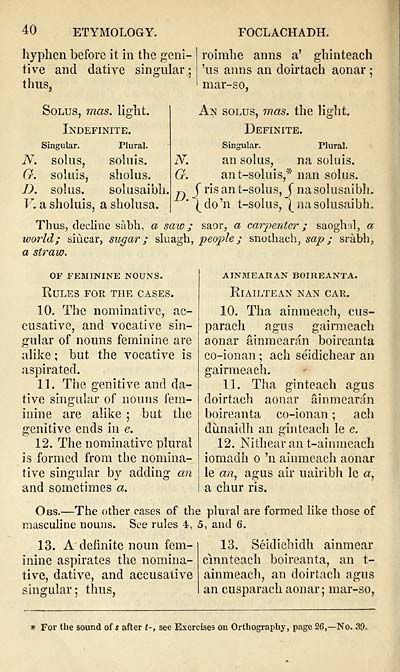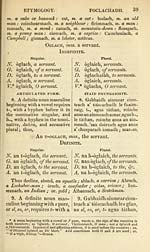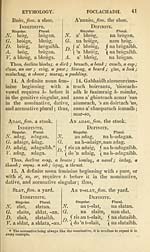Books and other items printed in Gaelic from 1841 to 1870 > Stéidhean a' Ghràmair Ghaëlig
(68) Page 40
Download files
Complete book:
Individual page:
Thumbnail gallery: Grid view | List view

40 ETYMOLOGY.
FOCLACHADH.
hyphen before it in tìie geni-
tive and dative
tlms,
singular
roirahe amis a' ghinteach
'us anns an doirtach aonar ;
mar-so,
Solus, mas. light.
Indefinite.
Singular.
N. solus,
O. soluis,
D. solus.
V. a sholuis.
Plural.
soluis.
sholus.
solusaibh.
a sholusa.
An solus, mas. the light.
Definite.
Singular. Plural.
N. an solus, na soluis.
G. ant-soluis,* nan solus.
( ris an t-solus, f na solusaibh.
' \ do 'n t-solus, \ na solusaibh.
Thus, decline sàbh, a saw ; saor, a carpenter ; saoghal, a
world; siùcar, sitgar ; sluagh, people ; snothach, sap ; sràbh,
a straw.
OF FEMININE NOUNS.
RULES FOR THE CASES.
10. The nominative, ac-
cusative, and vocative sin-
gular of nouns feminine are
alike ; but the vocative is
aspirated.
11. The genitive and da-
tive singular of nouns fem-
inine are alike ; but the
genitive ends in e.
12. The nominativc pluraì
is formed from the nomina-
tive singular by adding àn
and sometimes a.
AINMEARAN BOIREANTA.
RlAILTEAN NAN CAR.
10. Tha ainmeach, cus-
parach agus gairmeach
aonar ainmearan boireanta
co-ionan ; ach seidichear an
gairmeach.
11. Tha ginteach agus
doirtach aonar àinmearan
boireanta co-ionan ; acli
dùnaidh an ginteach le e.
12. Nithear an t-ainmeach
iomacìh o 'n ainmeach aonar
le an, agus air uairìbh le a,
a chur ris.
Obs. — The other cases of the plural are formed like those of
lìiasculine nouns. See rules 4, 5, and 6.
13. Sèidichidh ainmear
13. A definite noun fem-
inine aspirates the nomina-
tive, dative, and accusative
sìngular; thus,
cìnnteach boireanta, an t-
ainmeach, an doirtach agus
an cusparach aonar; mar-so,
* For the sound of s after t-, see Exercises on Orthography, page 26,— No. 39.
FOCLACHADH.
hyphen before it in tìie geni-
tive and dative
tlms,
singular
roirahe amis a' ghinteach
'us anns an doirtach aonar ;
mar-so,
Solus, mas. light.
Indefinite.
Singular.
N. solus,
O. soluis,
D. solus.
V. a sholuis.
Plural.
soluis.
sholus.
solusaibh.
a sholusa.
An solus, mas. the light.
Definite.
Singular. Plural.
N. an solus, na soluis.
G. ant-soluis,* nan solus.
( ris an t-solus, f na solusaibh.
' \ do 'n t-solus, \ na solusaibh.
Thus, decline sàbh, a saw ; saor, a carpenter ; saoghal, a
world; siùcar, sitgar ; sluagh, people ; snothach, sap ; sràbh,
a straw.
OF FEMININE NOUNS.
RULES FOR THE CASES.
10. The nominative, ac-
cusative, and vocative sin-
gular of nouns feminine are
alike ; but the vocative is
aspirated.
11. The genitive and da-
tive singular of nouns fem-
inine are alike ; but the
genitive ends in e.
12. The nominativc pluraì
is formed from the nomina-
tive singular by adding àn
and sometimes a.
AINMEARAN BOIREANTA.
RlAILTEAN NAN CAR.
10. Tha ainmeach, cus-
parach agus gairmeach
aonar ainmearan boireanta
co-ionan ; ach seidichear an
gairmeach.
11. Tha ginteach agus
doirtach aonar àinmearan
boireanta co-ionan ; acli
dùnaidh an ginteach le e.
12. Nithear an t-ainmeach
iomacìh o 'n ainmeach aonar
le an, agus air uairìbh le a,
a chur ris.
Obs. — The other cases of the plural are formed like those of
lìiasculine nouns. See rules 4, 5, and 6.
13. Sèidichidh ainmear
13. A definite noun fem-
inine aspirates the nomina-
tive, dative, and accusative
sìngular; thus,
cìnnteach boireanta, an t-
ainmeach, an doirtach agus
an cusparach aonar; mar-so,
* For the sound of s after t-, see Exercises on Orthography, page 26,— No. 39.
Set display mode to:
![]() Universal Viewer |
Universal Viewer | ![]() Mirador |
Large image | Transcription
Mirador |
Large image | Transcription
Images and transcriptions on this page, including medium image downloads, may be used under the Creative Commons Attribution 4.0 International Licence unless otherwise stated. ![]()
| Rare items in Gaelic > Books and other items printed in Gaelic from 1841 to 1870 > Stéidhean a' Ghràmair Ghaëlig > (68) Page 40 |
|---|
| Permanent URL | https://digital.nls.uk/101712415 |
|---|
| Description | Out-of-copyright books printed in Gaelic between 1631 and 1900. Also some pamphlets and chapbooks. Includes poetry and songs, religious books such as catechisms and hymns, and different editions of the Bible and the Psalms. Also includes the second book ever published in Gaelic in 1631. |
|---|

